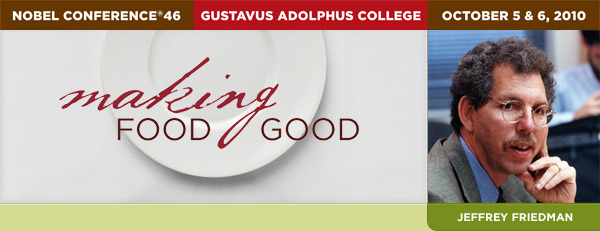
In 1994, Dr. Jeffrey Friedman, MD, discovered the mouse Ob gene that encodes the hormone leptin released by fat cells. Leptin, along with other blood-borne and neural signals, is a key modulator of the activity of the circuits in the hypothalamus that precisely regulates eating behavior and energy expenditure. Friedman, one of the featured speakers at the 2010 Nobel conference, "Making Food Good," is a Howard Hughes Medical Investigator and Marilyn M Simpson Professor at Rockefeller University, where he is also director of the Starr Center for Human Genetics. Friedman, a member of the National Academy of Sciences and its Institute of Medicine, has over 160 publications to his credit and numerous honors including the 2009 Shaw Prize in Life Science and Medicine. His work has been powerful in recasting thinking on the pathogenesis of human obesity and is guiding future development of treatments that reduce the risks of a number of obesity-associated medical complications.
In a May 2009 interview for the journal Nature, Friedman calls on us to reevaluate our attitudes toward obesity and consider what we have learned about the nature of the biological loops that control food intake and body weight in designing safe, effective anti-obesity therapies.
With the growing realization that mainly biological factors contribute to obesity, it is hoped that this condition will be de-stigmatized, reducing the compulsion by obese individuals to achieve an arbitrary ideal, lean weight and instead motivate them to focus on improving their health.
We look forward with great anticipation to hear what Jeffrey Friedman has to say about how a better understanding of the neurobiological control of satiety and hunger and the genetic basis of obesity in humans should aid in its prevention and treatment. We hope that you can join us to hear more at Nobel Conference 46 on October 5 & 6, 2010.
Mike Ferragamo, Biology
|

